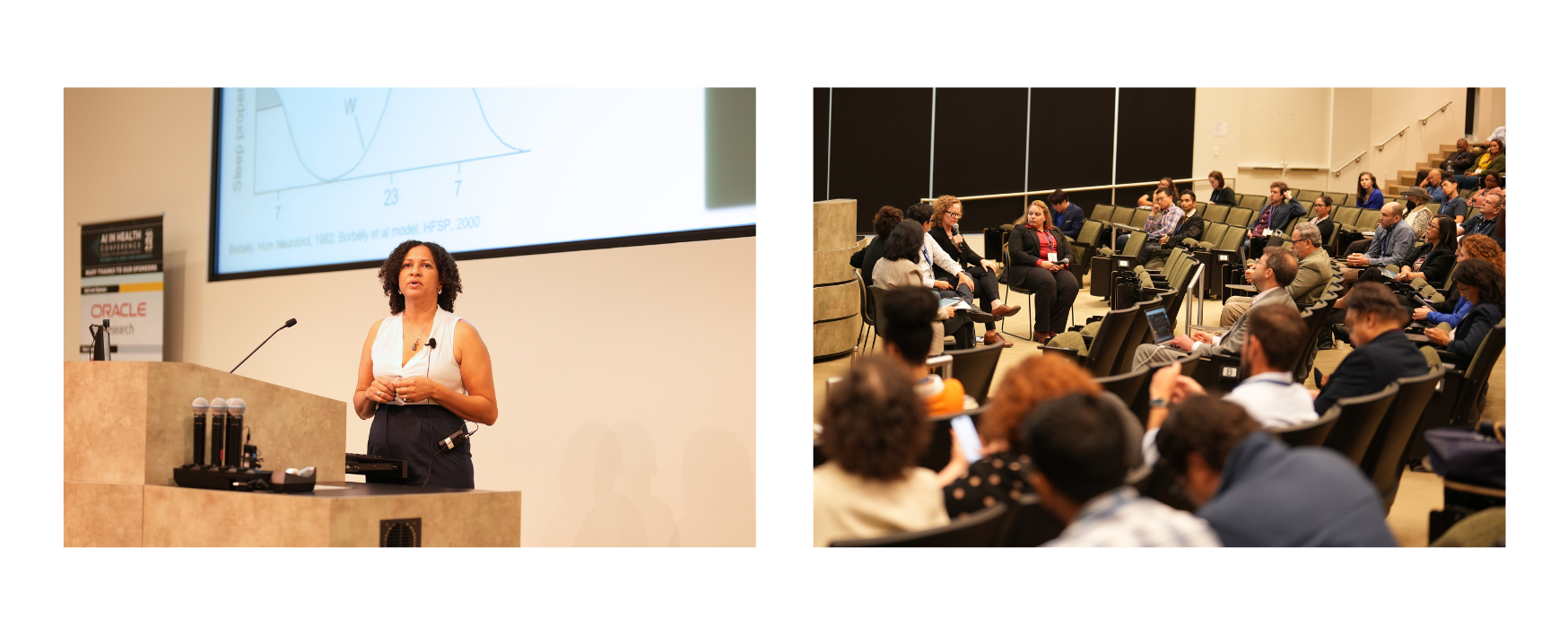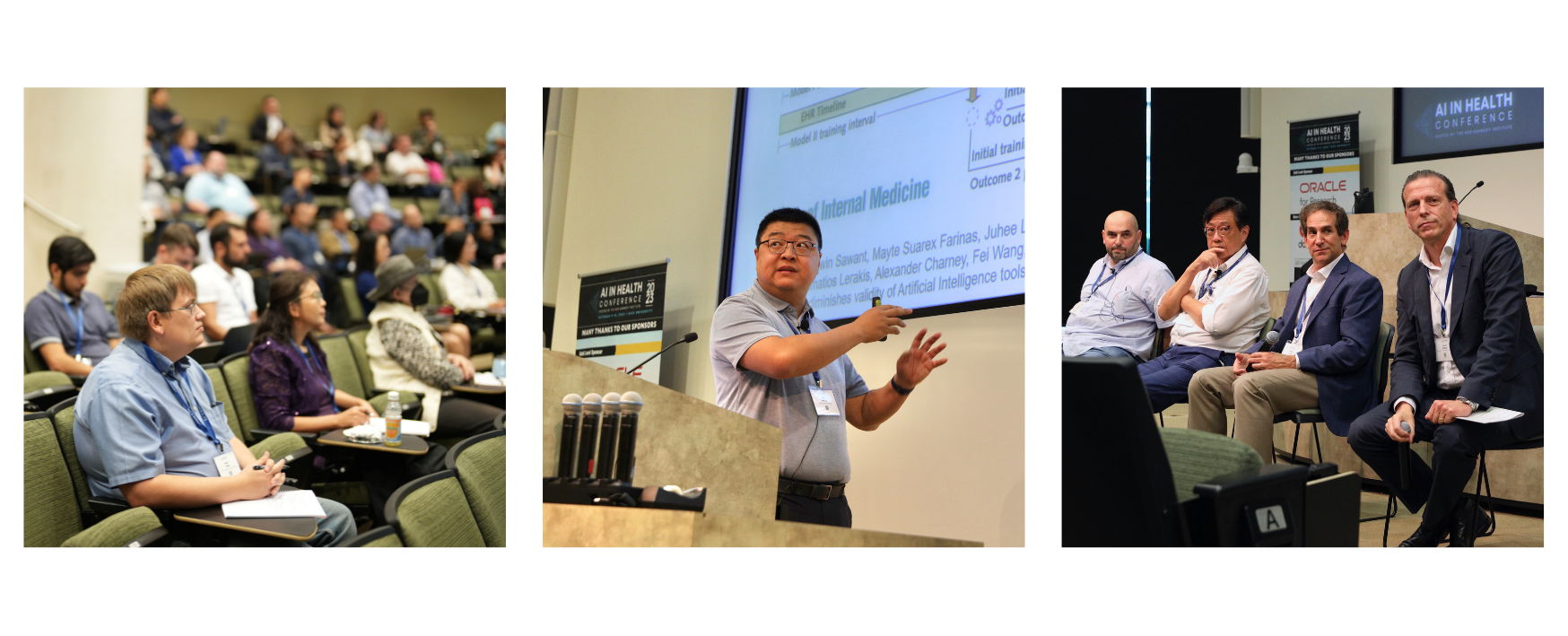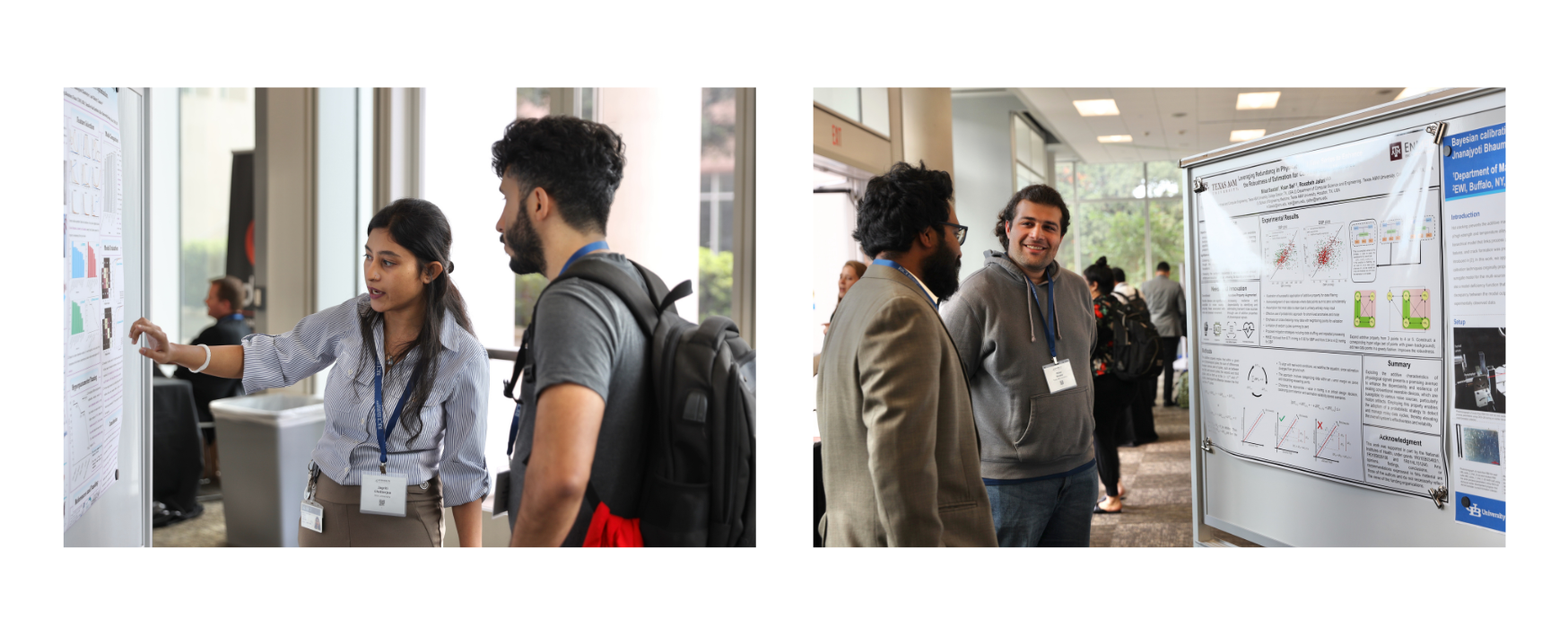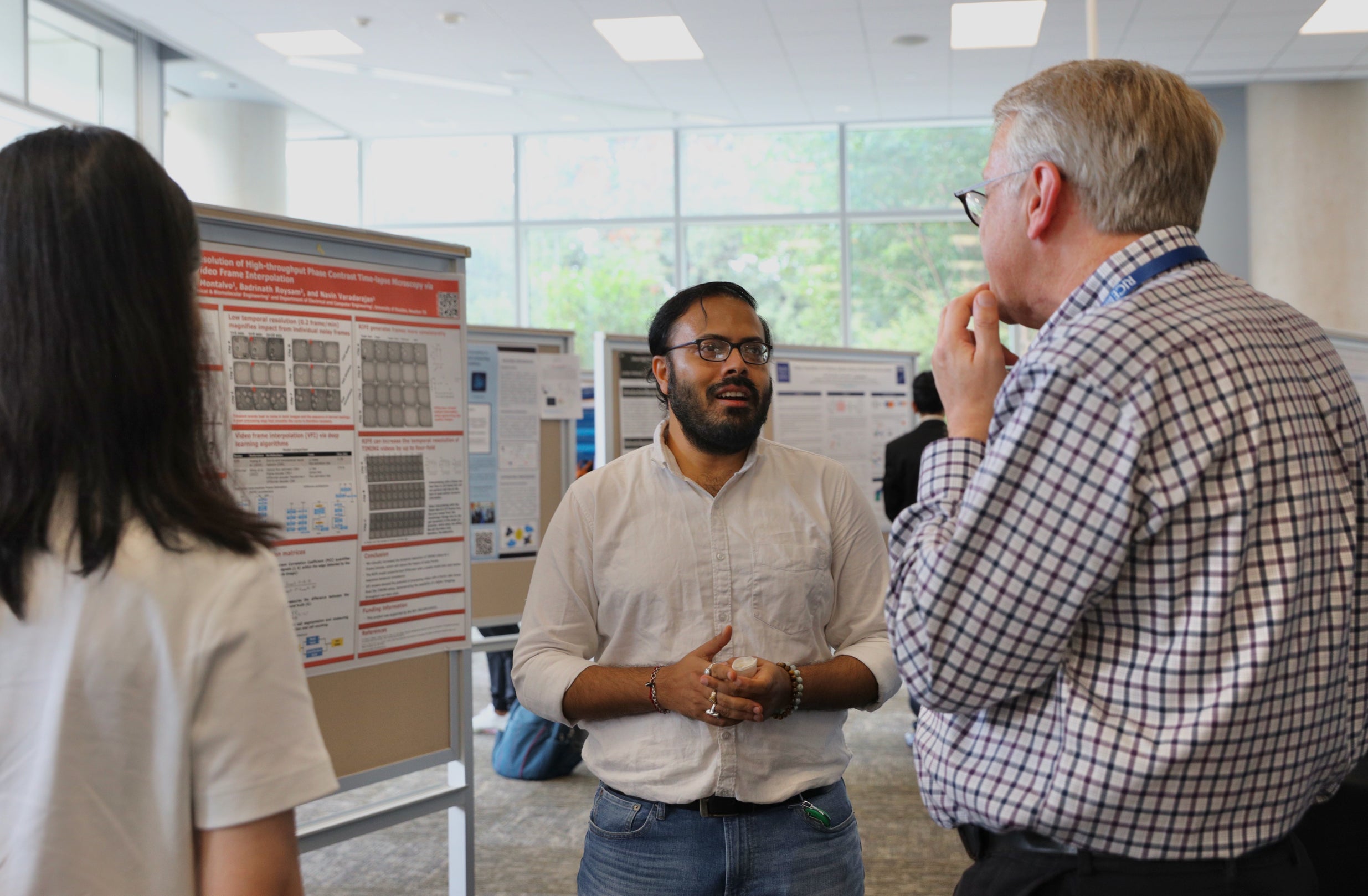Energized by the community and insights that were unveiled at the inaugural conference in 2022, the 2nd annual AI in Health Conference brought together experts from a plethora of specialties to dissect, critique, and marvel at the ability of Artificial Intelligence (AI) to not just impact but transform healthcare.
The conference took place October 9-12, 2023 at Rice University’s BRC in Houston, TX, unfolding as an exciting four days of research-driven outlooks and focused workshops. Over 450 attendees came together throughout the course of the conference from 23 states and 14 countries to learn from nationally recognized keynote speakers, leading experts, and renowned researchers. Attendees also had the opportunity to sit in on technical sessions and discussion panels that unpacked the latest AI advancements, providing both an in-depth and high-level overview of the current state of technology in healthcare.
The content of the main conference (October 10-11) was structured into four themes: the data science of sleep, generative AI’s role in healthcare, transparency and health equity, and the future of predictive health. Each theme analyzed progress and questioned implications to cover a comprehensive look at the past, present, and future.
The Data Science of Sleep – Why It Matters
Keynote speakers Dr. Ashura Buckley (The National Institute of Mental Health, NIH) and Dr. Justin Baker (McLean Hospital; Harvard Medical School) kicked off the conference to address the impact of sleep on disorder development, mental illness, brain behavior, and personal health. Insights from the session revealed that sleep health has a significant impact not only on the health of individuals, but also on societal and economic levels, as sleep deprivation is estimated to cost $411 billion in lost productivity in the US alone. The pursuit of understanding sleep through the lens of AI is not merely academic but a response to an immediate call for public health innovation. “The way to think about sleep is akin to exercise or diet,” said Dr. Buckley. “It is an essential, fundamental pillar of health.”
Drs. Buckley and Baker then joined in a panel with Dr. Michelle Patriquin (Menninger Clinic; Baylor College of Medicine) and Dr. Mya Shiess (McGovern Medical School, UTHealth Houston) to discuss applications and data analysis techniques for clinicians on the ground, unpacking what it takes to mitigate health issues rooted in sleep behavior.

Left: Keynote Speaker Dr. Ashura Buckley
Right: Generative AI Panel
Exploring GenAI’s Role in Healthcare
Tuesday afternoon’s session of the conference paired thought leaders from the Texas Medical Center and Houston’s Rice University to explain and reflect on the emergence of generative AI (GenAI), not just as a general-use tool but as a catalyst for more efficient healthcare practices, including enhanced clinical documentation and patient interaction. While the future of Large Language Model (LLM) applications in healthcare continues to look promising, the integration of AI introduces subsequent challenges. Panelists Drs. Lydia Kavraki (The Ken Kennedy Institute, Rice University), Kristen Kostick-Quenet (Baylor College of Medicine), Vicente Ordóñez-Román (Rice University), Kirsten Ostherr (Medical Humanities Research Institute, Rice University), and Laila Rasmy (McWilliams School of Biomedical Informatics, UTHealth Houston) addressed ethical considerations and regulatory reforms that are crucial for steering the future of AI in health in a more responsible and reliable direction.
Balancing Transparency, Equity, and Bias in the Age of AI
Keynote speaker Dr. Fei Wang (Weill Cornell Medicine, Cornell University) set the tone for a round of presentations on navigating transparency, equity, and bias in the age of AI, highlighting the importance of building trust in clinician-patient relationships and prioritizing accuracy and fairness in AI applications. Dr. Theodora Chaspari (University of Colorado Boulder) further stressed concerns of data privacy and socio-demographic biases impacting the development of technological tools and algorithms for clinical adaptation. She explained that models must be interrogated for bias and fairness at every stage of development, not just at the outcome stage to ensure that AI and machine learning algorithms can ethically support both physical and mental healthcare.
Attendees also learned from Dr. Roozbeh Jafari (Texas A&M University) on the use of digital twins in cardiovascular health and how data monitoring through wearables leverages AI in ways that enhance the ability to extract actionable information from patients. Dr. Jafari offered that these applications not only show immediate promise for clinical workflows but also for future translational research efforts that could create lasting impact for public health.
Looking to the Future of Predictive Health
Successful AI development requires the curation of good data sets. This is true in any industry, but it is imperative in healthcare as discussed throughout the two days of research-driven deep-dives at the AI in Health Conference. Wednesday afternoon featured a keynote session on data-utilization and a series of presentations on AI and machine learning’s ability to detect, diagnose, and monitor health conditions.
Dr. Jeffrey Brown (TriNetX) stated that “using real-world data is not a choice. The only decision is how to best apply it.” This sentiment underlined use-cases described by Drs. David Jaffray (The Institute for Data Science in Oncology, The University of Texas MD Anderson Cancer Center), Vladimir Braverman (Rice University), and Stephen Wong (Houston Methodist). Their panel closed out the 2023 conference in a discussion on how clinical education, training, and practice should aim to efficiently maximize quality data use so that the future of healthcare is meaningfully impacted by experts in healthcare as well as experts in technology.

Left: Attendees at AIHC23
Center: Keynote Speaker Dr. Fei Wang
Right: Future of Predictive Health Panel
Building Lasting Connections
Building and inspiring a community that strives for innovation is what the Ken Kennedy Institute’s AI in Health Conference sets out to do. Each day of the conference included opportunities to build connections with a community of researchers, clinicians, engineers and entrepreneurs eager to transform healthcare through innovative solutions and human-centered care. Evening networking and poster receptions provided a space for attendees to learn from 70 rising AI and data scientists and the eight sponsoring companies, drawing in top experts and institutions in the Texas Medical Center, across the nation, and even internationally.

Comprehensive Workshop Training at AIHC23
The 2023 AI in Health Conference was more than a research conference. Five specialized workshops were offered between October 9-12 for attendees interested in expanding their expertise in AI, data science, and machine learning. Workshops, along with their organizers, included: RAD Genomics (Rice University), Digital Twins in Healthcare + Applying AI/ML to Accelerate Innovation in Healthcare (NVIDIA), The Future of Robot-Assisted Nursing (Rice University), Challenges and Opportunities of AI Entrepreneurship in Healthcare (The Ken Kennedy Institute, Rice University), and Team Data Science in Cancer: Bridging People and Perspectives for Progress (The Institute for Data Science in Oncology, The University of Texas MD Anderson Cancer Center). The conference also featured a mini-workshop organized by Rice University’s Medical Humanities Research Institute director, Dr. Kirsten Ostherr, on Responsible AI for Health – Deep Dive on Race and Ethnicity in Data.
The expansive opportunities available at the AI in Health Conference set the stage for collaborative learning, insightful discussion, and meaningful connection. The knowledge shared and partnerships formed between academia, industry, and healthcare entities hold promise for accelerated translational research and a safer, healthier, and more equitable future.
Watch the Recordings
Recorded sessions from the 2023 AI in Health Conference are available on the Ken Kennedy Institute YouTube channel.
Save the Date
The 3rd annual AI in Health Conference will take place September 9-13, 2024 in Houston, TX. Join the conference newsletter to stay informed.
Conference Sponsors
Gold — Oracle for Research
Silver — DDN | Houston Methodist Academic Institute | Mark III Systems | The University of Texas MD Anderson Cancer Center
Bronze — DUG | Hammerspace | SchedMD

